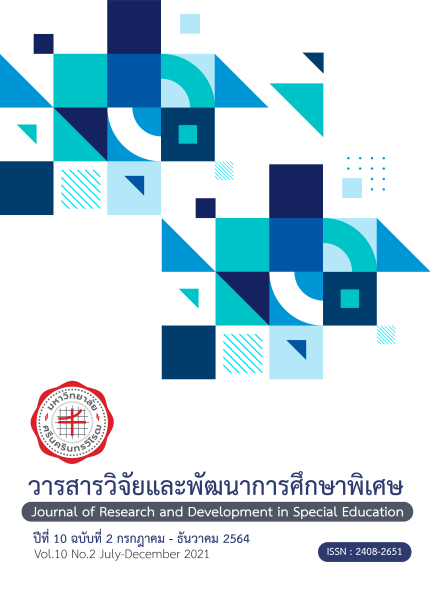การพัฒนาหลักสูตรการปลูกผักสำหรับผู้ที่มีภาวะออทิสซึมศักยภาพต่ำ
Abstract
บทคัดย่อ ความประสงค์ของงานวิจัยนี้ คือ เพื่อพัฒนาหลักสูตรการปลูกผักเพื่อใช้ในการบำบัดภาวะออทิสซึมศักยภาพต่ำ และศึกษาความก้าวหน้าของความสามารถในการปลูกผักในนักเรียนที่มีภาวะออทิสซึมศักยภาพต่ำ ผู้ที่เข้าร่วมในงานวิจัยนี้ประกอบด้วยบุคคลสามคนที่มีอายุระหว่าง 18 ถึง 30 ปี ซึ่งถูกวินิจฉัยโรคว่าเป็นผู้ที่มีภาวะออทิสซึมศักยภาพต่ำ วิธีวิจัยเป็นรูปแบบการวิจัยเชิงบรรยาย และเครื่องมือสำหรับงานวิจัยนี้ประกอบด้วย (1) หลักสูตรการปลูกผักสำหรับบุคคลที่มีภาวะออทิสซึมศักยภาพต่ำ (2) แผนการเรียนรู้การเพาะเมล็ดทานตะวัน และแผนการเรียนรู้การเพาะเมล็ดผักบุ้ง รวมทั้งหมด 10 แผน และ (3) แบบประเมินความสามารถในการเพาะเมล็ดทานตะวันของบุคคลที่มีภาวะออทิสซึมศักยภาพต่ำ และแบบประเมินความสามารถในการเพาะเมล็ดผักบุ้งของบุคคลที่มีภาวะออทิสซึมศักยภาพต่ำ รวมทั้งหมด 10 ชุด ตัวเลขที่รวบรวมได้จากการประเมินรูปแบบการพัฒนาหลักสูตรการปลูกผัก และตัวเลขข้อมูลความสามารถของนักเรียนที่เข้าร่วมงานวิจัย ได้รับการประเมิน วิเคราะห์ โดยผู้เชี่ยวชาญสามท่าน เพื่อให้ได้ดัชนีความตรงเชิงเนื้อหา และจำนวน เปอร์เซ็นต์ ผลการวิจัยชี้ให้เห็นว่า (1) หลักสูตรการปลูกผักสำหรับบุคคลที่มีภาวะออทิสซึมศักยภาพต่ำเป็นเครื่องมือที่มีความเหมาะสมและมีคุณค่าแก่การนำไปใช้ในการสอนเพื่อพัฒนาทักษะชีวิตที่ดีขึ้นของนักเรียน (2) ความสามารถของนักเรียนผู้เข้าร่วมการวิจัยนี้เพิ่มขึ้นอย่างชัดเจน เพราะพวกเขาสามารถดำเนินการผลิตกล้าผักตามกระบวนการทุกอย่างด้วยตนเองจนสำเร็จโดยไม่ต้องมีผู้แนะนำ หรือดูแลควบคุมแต่อย่างใด คำสำคัญ: หลักสูตรการปลูกผัก, ออทิสซึมศักยภาพต่ำ ABSTRACT The purposes of this research were to develop the Vegetable Planting Program for use in low functioning autism therapy and to study the improvement in ability to plant vegetable of autistic students. The research participants included three individuals, 18 to 30 years of age, who had been diagnosed with low functioning autism. The research methodology was descriptive research type. And, the research tools consisted of (1) The Vegetable Planting Program for persons with low functioning autism, (2) Ten Learning Plans for Sun Flower Seeding Program and Learning Plans for Morning Glory Seeding Program, and (3) Ten sets of Assessment Form of Sun Flower Seeding Ability and Assessment Form of Morning Glory Seeding Ability of the Persons with Low Functioning Autism. The collected data of the program development and seeding ability data of the researched students were analyzed by three experts to obtain content validity index (CVI) and percentages. Results indicate that (1) The Vegetable Planting Program for Persons with Low Functioning Autism is a suitable and valid tool for use in training the learners for their better life skills, and (2) all of the participants’ ability is clearly improved because they eventually can be able to accomplish seeding production processes on their own without any guidance or prompting. Keywords: Vegetable Planting Program, Low Functioning AutismDownloads
Download data is not yet available.
Downloads
Published
2021-12-31
Issue
Section
Research article




